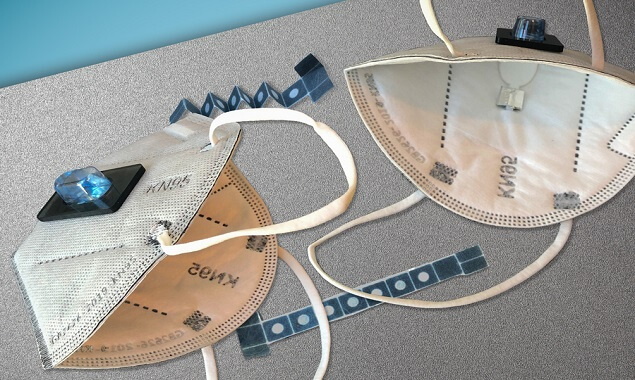
29 Jun Face Mask Developed to Detect Covid-19 Infection
Engineers at MIT and Harvard University have designed a novel face mask that can diagnose the wearer with Covid-19 within about 90 minutes. The masks are embedded with tiny, disposable sensors that can be fitted into other face masks and could also be adapted to detect other viruses.
The sensors are based on freeze-dried cellular machinery that the research team has previously developed for use in paper diagnostics for viruses such as Ebola and Zika. In a new study, the researchers showed that the sensors could be incorporated into not only face masks but also clothing such as lab coats, potentially offering a new way to monitor health care workers’ exposure to a variety of pathogens or other threats.
“We’ve demonstrated that we can freeze-dry a broad range of synthetic biology sensors to detect viral or bacterial nucleic acids, as well as toxic chemicals, including nerve toxins. We envision that this platform could enable next-generation wearable biosensors for first responders, health care personnel, and military personnel,” says James Collins.
A Diagnostic Face Mask
As the researchers were finishing up their work on the wearable sensors early in 2020, Covid-19 began spreading around the globe, so they quickly decided to try using their technology to create a diagnostic for the SARS-CoV-2 virus.
To produce their diagnostic face mask, the researchers embedded freeze-dried sherlock sensors into a paper mask. As with the wearable sensors, the freeze-dried components are surrounded by silicone elastomer. In this case, the sensors are placed on the inside of the mask, so they can detect viral particles in the breath of the person wearing the mask.
The mask also includes a small reservoir of water that is released at the push of a button when the wearer is ready to perform the test. This hydrates the freeze-dried components of the SARS-CoV-2 sensor, which analyzes accumulated breath droplets on the inside of the mask and produces a result within 90 minutes.
“This test is as sensitive as the gold standard, highly sensitive PCR tests, but it’s as fast as the antigen tests that are used for quick analysis of Covid-19,” Nguyen says.
The researchers have filed for a patent on the technology and they are now hoping to work with a company to further develop the sensors.
